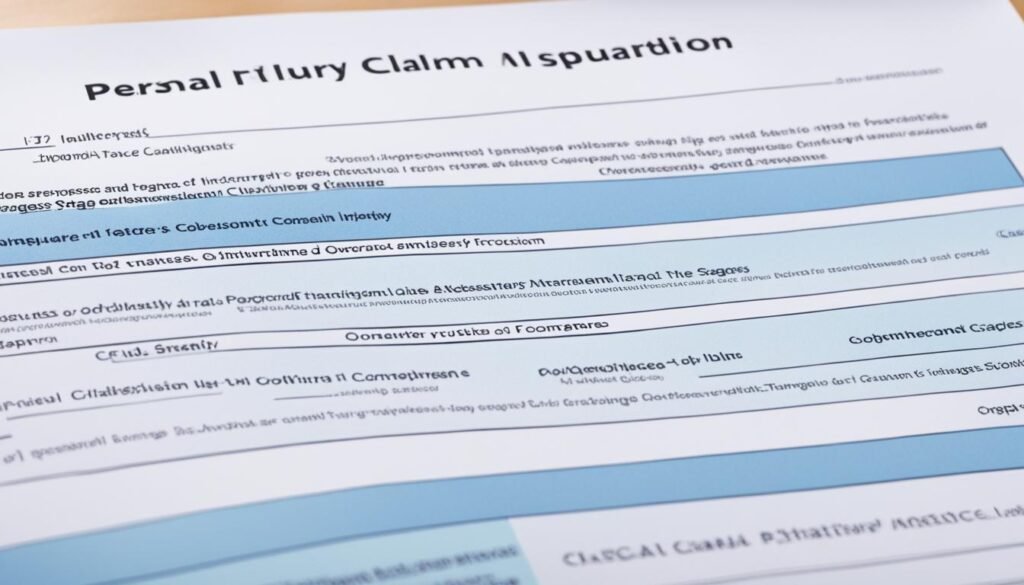Did you know the average settlement for a personal injury case in the U.S. is between $3,000 and $75,0001? Many people still have questions about personal injury claims and what to expect. After an accident, it’s normal to feel unsure about the process. Luckily, a skilled personal injury lawyer, like those at Super Attorneys Of Irvine, can help guide you through your case.
This article will answer 23 common questions about personal injury cases. We’ll cover topics like liability, medical costs, accident settlements, and workplace injuries. We aim to give you the knowledge you need to make smart choices about your claim2.
Key Takeaways
- Personal injury claims cover many types of accidents, from car crashes to workplace incidents and product liability cases.
- The time limit to file a personal injury lawsuit varies by state, usually between 1 to 4 years.
- Personal injury cases can include both economic (medical bills, lost wages) and non-economic (pain and suffering) damages.
- In some states, you can still get compensation even if you’re partly to blame, thanks to comparative negligence laws.
- Having an experienced personal injury attorney can greatly improve your chances of getting a fair settlement.
Understanding the Personal Injury Claim Process
How a Personal Injury Case Begins
If you’ve been hurt because of someone else’s mistake, the first step is to file a summons and complaint in court. This starts the personal injury lawsuit by giving the defendant the documents3. You must explain why you’re suing and what damages you want.
Then, you’ll do important things to strengthen your case, like:
- Documenting your injuries with photos
- Getting your medical records and bills
- Telling your lawyer about the incident and any witnesses
Most personal injury cases settle out of court through settlement negotiations before going to trial3. These talks involve looking into the case, talking to experts, and sharing info with the other side3. This way, you might settle faster than going straight to trial3.
| Key Steps in the Personal Injury Claim Process |
|---|
| 1. File a summons and complaint |
| 2. Serve the defendant |
| 3. Gather evidence and documentation |
| 4. Engage in settlement negotiations |
| 5. Proceed to trial, if necessary |

“The personal injury claim process can be complex, but working with an experienced attorney can help ensure your rights are protected and you receive the compensation you deserve.”
Determining the Likelihood of Going to Trial
Most personal injury cases don’t make it to trial. In fact, 90 to 95% settle outside court in Texas4. This way, the plaintiff gets some compensation, but it’s usually less than what a trial might offer5.
Going to trial is more likely when the facts are disputed or legal issues are contested4. Serious injuries like brain or spinal cord injuries often lead to trials because of the high stakes4. A strong case means better chances of a fair settlement.
If your case goes to trial, your lawyer will prepare you for what’s ahead. In Texas, a majority of jurors must agree on damages in personal injury cases4. In federal courts, all jurors must agree4. Trials can result in more money, especially if punitive damages are awarded, but they take longer than settlements4.
The trial’s outcome is a final decision on who is liable and how much they must pay4. A skilled lawyer can often settle claims without a trial5.

| Factors Considered in Settlement Negotiations | Reasons for Proceeding to Trial |
|---|---|
|
|
“The outcome of a trial in a personal injury case results in a legally binding decision on liability and monetary compensation that the defendant must pay.”
Trials can last a long time, depending on the injuries, medical details, number of defendants, and the damages sought5.
Estimating the Value of Your Personal Injury Claim
Factors that Influence Claim Value
Figuring out how much your personal injury claim is worth isn’t easy. Yet, there are key factors that can help estimate the potential recovery6. The main parts are the economic damages like medical bills and lost wages. Then, these are multiplied by a factor between 1.5 to 5, based on how bad your injuries are and other factors6.
Victims of personal injury claims can get money for medical care, lost wages, pain, and more6. But, the settlement can’t be more than the policy limits6. Insurance policies have limits that could affect the settlement. If the settlement is over the limit, you might negotiate or accept the policy limit and sue for the rest7.
The defendant’s resources and ability to pay also play a role in the claim value6. Personal injury cases are complex, making it hard to put a price on losses with just math7. The compensation can vary a lot, depending on your job and how the injury affects your life7.
Talking to an experienced personal injury lawyer, like those at Super Attorneys Of Irvine, can give you a better idea of what you might get6. They can guide you through the process and help you get the most compensation you deserve.
| Factor | Description |
|---|---|
| Economic Damages | Medical bills, lost wages, and other quantifiable expenses |
| Pain and Suffering Multiplier | A factor of 1.5 to 5, based on the severity of injuries and other circumstances |
| Insurance Policy Limits | The maximum amount the insurance company will pay, which can impact the settlement |
| Defendant’s Resources | The defendant’s ability to pay, which can influence the claim value |
Comparative Negligence and Its Impact on Your Claim
If you were partly to blame for your injury, you might still get compensation in Nevada9. The state’s comparative negligence law lets you recover damages even if you’re not fully to blame9. You just need to be less than 50% at fault to get a share of what you would have gotten otherwise9. A jury will figure out how much fault everyone has, and you’ll get less money based on your share.
Comparative negligence is more fair than the old contributory negligence rule, which meant no money if you were even a little to blame9. Now, you can get money for the harm that wasn’t your fault9.
If the other person acted recklessly or on purpose, you might get extra money for punitive damages9. These damages cover things like medical bills and lost wages, as well as pain and suffering9.
But, figuring out comparative negligence can be tricky10. Some states have different rules, like a modified version that affects when you can get money10. It’s best to talk to a lawyer who knows the laws in your area10.
| State | Comparative Negligence Rule | Statute of Limitations |
|---|---|---|
| California | Pure comparative negligence | 2 years |
| Florida | Pure comparative negligence | 4 years |
| Louisiana | Pure comparative negligence | 1 year |
| New York | Pure comparative negligence | 3 years |
In summary, Nevada’s law lets you get damages even if you were partly to blame for the accident, as long as you weren’t more than 50% at fault9. You’ll get less money based on how much you were to blame, and you could get more if the other person was really bad9. It’s important to know how comparative negligence works in your state when you’re making a personal injury claim.
Statute of Limitations for Personal Injury Claims
Time is crucial in personal injury claims. The statute of limitations sets a deadline to file a lawsuit. In Florida, you have two years to file a personal injury lawsuit11. This rule applies to many cases like car and truck accidents, motorcycle, bicycle, or pedestrian accidents, and more11.
Some cases have their own deadlines. For example, medical malpractice claims have a two-year limit, which can be up to four years in some cases11. Civil cases for assault or battery also have a two-year deadline11. Workers’ compensation claims usually have two years to file11.
The clock starts ticking from different times. It can begin on the injury date, when you discover the damage, or when someone dies from an injury11. It’s key to talk to a lawyer quickly to meet these deadlines and protect your rights11.
In Florida, you have two years from the injury date to file a personal injury claim, as stated in Florida Statutes Section 95.11(4)12. Missing this deadline can lead to your case being dismissed12. But, there are exceptions, like for children, where the deadline is until their eighth birthday12.
On March 24, 2023, a new law in Florida changed the deadline for negligence and personal injury cases from four years to two years12.
Understanding the statute of limitations for personal injury claims is key. It helps you file on time and protect your rights. With a personal injury lawyer’s help, you can manage deadlines and improve your chances of success1112.
Conclusion
When dealing with personal injury claims, having the right legal team is key. Super Attorneys Of Irvine offers the expertise you need. They help if you were hurt in an accident because someone else was careless13. They also assist with cases against government entities, aiming to get you the compensation you deserve.
Understanding how to file a personal injury claim is important. Knowing if you might go to trial helps you make smart choices. Super Attorneys Of Irvine guides you through complex issues like comparative negligence and ensures you meet the legal deadlines1314.
If you or someone close to you has been hurt, reach out to Super Attorneys Of Irvine. Call them at 949-996-9546 or visit businesslawyersirvine.com for a free consultation. They are dedicated to getting the best results for their clients15.
FAQ
How does a personal injury case begin?
What steps should I take after filing a personal injury case?
How likely is it that my personal injury case will go to trial?
How is the value of a personal injury claim determined?
What if I was partially responsible for my injury?
How long do I have to file a personal injury case?
Source Links
- https://www.askadamskutner.com/personal-injury/23-frequently-asked-questions-personal-injury-cases/
- https://www.justia.com/injury/faqs/
- https://www.dmlawusa.com/blog/a-guide-through-the-personal-injury-claim-process/
- https://www.vblawgroup.com/blog/personal-injury/texas-personal-injury-case-go-trial/
- https://www.lorenzandlorenz.com/blog/will-my-personal-injury-case-go-to-trial/
- https://1800lionlaw.com/how-much-should-i-ask-for-in-a-personal-injury-settlement/
- https://jsberrylaw.com/faq/how-much-is-my-personal-injury-claim-worth/
- https://www.fvflawfirm.com/personal-injury-faq/
- https://www.triumphlaw.com/faqs/how-does-comparative-negligence-affect-personal-injury-claim/
- https://www.akdlawyers.com/personal-injury/comparative-negligence-effect/
- https://www.chaliklaw.com/faqs/what-is-the-statute-of-limitations-for-personal-injury-in-florida/
- https://farahandfarah.com/faqs/what-is-the-florida-statute-of-limitations-for-personal-injury/
- http://www.selarzlaw.com/legal-resources/personal-injury-faqs/
- https://www.gilleonlawfirm.com/back-injury/spine-injury-faqs/
- https://kuzyklaw.com/faqs/

